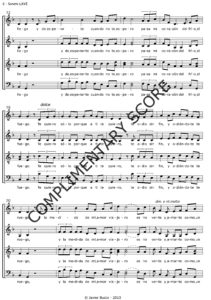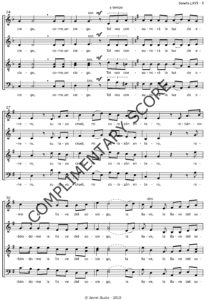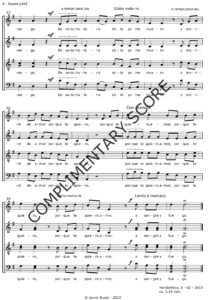Interview with Javier Busto
María Zugazabeitia
The composer Javier Busto, who confesses that he feels more comfortable conducting music than he does creating it, has kindly found the time to answer a series of questions from the ICB. The interview is fairly informal and has two main aims: firstly, to give readers a better idea of Busto as a man – the personal side of a musician who dedicates his professional life to medicine. Secondly, we hope to share the artist’s vision of his own work. We touch on music, senses, vocation, inspiration and emotions – enjoy!
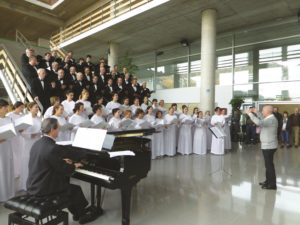
María Zugazabeitia: I imagine everyone asks you the same question, but I’ll ask it anyway: how did you get into music?
Javier Busto: It was quite simple; my family is full of musicians. As a child I sang in the parish choir at Hondarribia, and I was also part of the Escolanía de Lekarotz, a choir run by the Capuchin friars. The Beatles came on the scene while I was still young. As far as choral music went, it was thanks to my time in the university choir and being given the chance to conduct the Basque students’ choir at Valladolid, Coro Ederki, that I discovered my ability to create music. In turn, that allowed me to meet Erwin List, the renowned French choral conductor, who gave me the push I needed.
MZ You manage to combine your profession as a doctor with composing, two areas that might seem to be poles apart at first glance. Do you think that these two disciplines (music and medicine) have anything in common?
JB Without a doubt: both are about therapy, as much for the mind as the body, because you are sharpening your senses. Medicine is more individual, while writing choral music, which is what I do, is more general and group-based, but still excellent therapy.
MZ And on a personal level, do you find it easy to lead this ‘double life’, in terms of work?
JB It has been fine, up until 13 August – I name that date because I am retiring as a doctor, which will allow me to dedicate myself more fully to music again.
MZ Staying for a moment with the subject of working in two different jobs, I dare say that with both medicine and music, the vocational factor is fundamental. In your case, do you carry out both with the same amount of passion, or do you see medicine as work and music as pleasure?
JB At first, medicine was not solely vocational for me – I always wanted to be a pharmacist, but my experience in Santiago de Compostela with the ‘pharmacy’ was not a good one. With work and experience, I have come to be very passionate about medicine; in fact, in the last few years music has taken a back seat to it. As of 13 August I hope music will go back to filling the part of my life it ought to.
MZ Now let’s move on to speak about your work. In retrospect, how would you describe your style as a composer?
JB My first compositions were for a folk group, to be sung accompanied by a guitar. In my next phase, from 1976, I started writing choral works – it was all self-taught, I was writing as it came to me, not really with any aim in mind. Following that I studied a lot of choral scores in many different styles, which gave me an idea of what I was working towards and allowed me to start giving more direction to what I was writing. That would be my second phase, which I refer to as ‘tonal, with a proper structure’ (for example Ave Maria para SATB). After that I entered my third phase, where I began to develop my work in a more conscious way, trying to break down the music I was writing so that the beginning and end of each piece were not too similar to one another (for example Gloria de la Missa Brevis pro Pace). And now there is a fourth phase, in which I am starting to bring the previous two together by giving shape to everything I write and creating a more balanced kind of music. That is my main aim; a subjective one, I am well aware. I could sum up by saying that I try to compose with the objective of really touching a chord with the conductor, the singers and the audience, in that order.
MZ They say that everything comes in phases. Which quality would you prefer to keep: the fresh approach of a young composer who dares to try anything, or the maturity of an expert who really know what he is doing?
JB I would keep both. Before I started winning competitions, the music I was writing was very unstructured, without any apparent order (for example Kondairaren Ihauterian or Missa Brevis pro Pace), but I knew perfectly well that by changing my writing style, merely in an aesthetic sense, I would win competitions, and I did. After that I tried to write more from the heart, although I still yearn to get back to the 1980s and 90s, to combine everything I learnt in those years.
MZ I have had the immense pleasure of being able to sing several of your works and I was always struck by your capacity to compose, on the one hand, such virtuoso and complex pieces as Missa Brevis pro Pace, in which the variety of sounds really has an effect on the audience, and on the other, far more melodic pieces such as A Tu Lado, where emotion comes to the fore. What is it that leads a composer to write these different types of pieces?
JB Experience and knowing how to adapt your work to what people are asking for, a good example of which was A Tu Lado, a habanera I wrote for the Torrevieja competition on the occasion of its fiftieth anniversary. I chose a text by Matías Antón Mena, quite unusual for a habanera, where love dominated the popular exaltation that is common in this style of music. In the mass, I was trying to set the angelic (women) against the earthly (men), and that is why the style is less coherent, even if it is still rich in emotion, since I was writing it during a time when terrorism was having a devastating effect on our country.
MZ And speaking of creation, many creative people have confessed to having a muse. What is it that inspires you?
JB Very definitely, my answer to that is: my work. The pieces come to me when I am working on one of them, because during the creative process ideas arise that might be useful for what I have in front of me, or else for other pieces. The lyrics are a fundamental source of inspiration, because they form the character of what I have going through my head.
MZ At times, inspiration can be hard to come by. What advice would you give to a composer who feels frustrated or at a dead end because they have been exhausted by the creative process?
JB I avoid giving advice because I have not had any formal training, by which I mean that I am self-taught. I can only say what I have found, and so I repeat: persistence and keeping my head full of useful writings both work as my inspiration.
MZ Do you identify with any particular composer or musician?
J.B.: Yes, with several current ones: Xabier Sarasola, Josu Elberdin, Eva Ugalde, Junkal Guerrero. As for historic musicians: Claude Debussy, Igor Stravinsky, Hugo Distler, Aita Donostia, Tomás Garbizu, Javier Bello Portu and Tomás Aragüés Bernard.
MZ Who in the world of music (and the history of music) have had most influence on your career?
JB Claude Debussy, Igor Stravinsky, Hugo Distler, are some of the foreign composers. With regard to Basque musicians, I would say Aita Donostia, Tomás Garbizu, Javier Bello Portu and Tomás Aragüés Bernard. And of course John Lennon and The Beatles.
MZ As well as choral works, you have also conducted various choirs throughout your career. From a personal and professional viewpoint, what do you feel that you get out of leading a choir?
JB Personally I have always felt more a choir conductor than a composer, since my greatest passion has always been that for leading choral groups. The sensations one experiences from conducting a choir are amazing; they bring the group closer together and allow it to sing as a chorus, transmitting emotion straight from the soul. And on top of that, it is all done through the human voice, in this case the medium of song.
MZ Just as an artisan is familiar with and gets the best out of the raw materials he works with in order to obtain the best possible result, do you think that being a conductor has helped you to get to know your instrument better, and therefore helped you to write high-quality work?
JB Definitely. My composing is based more on experience than training. Reading and listening to hundreds of different pieces over the years have defined the sounds that I am aiming for and helped me to give the choirs I have led a more distinctive personality. As for writing ‘high-quality work’, I will leave that for you to judge, but thank you for the compliment.
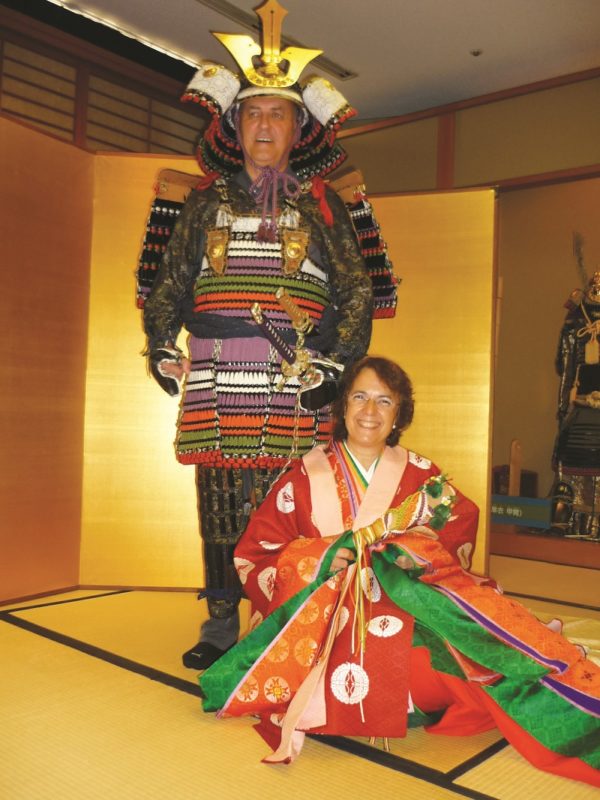
MZ Going back to the idea of inspiration, the Basque theme is present in many of your creations. How far and in what ways have your origins influenced your career?
JB Basque melodies and rhythms both make frequent appearances in my work, be they religious or secular pieces. They form the basis of my ideas because, in some ways, they are distinct from other cultures, and I enjoy reflecting the Basque-euskaldunak side of me in my music.
MZ Is it that your feelings of gratitude toward your homeland have led you to write homages such as Bidasoa? Or do the Basque Country’s customs, folklore and way of life form an intrinsic part of your personality and, by extension, your musical output?
JB Bidasoa is the name of the river (where it flows into the sea) that I am looking at as I answer your questions. It is an incredible scene which changes minute by minute: the light, the sound of the water, the boats and so forth all offer me a different picture every day. I also find that Hondarribia has a real beauty about it; the old town, the marina, the ‘mountain’ that overlooks it. And if you add to that the fact that the Basque Country is full of contrast, for me it is case closed: I live in the closest thing to paradise.
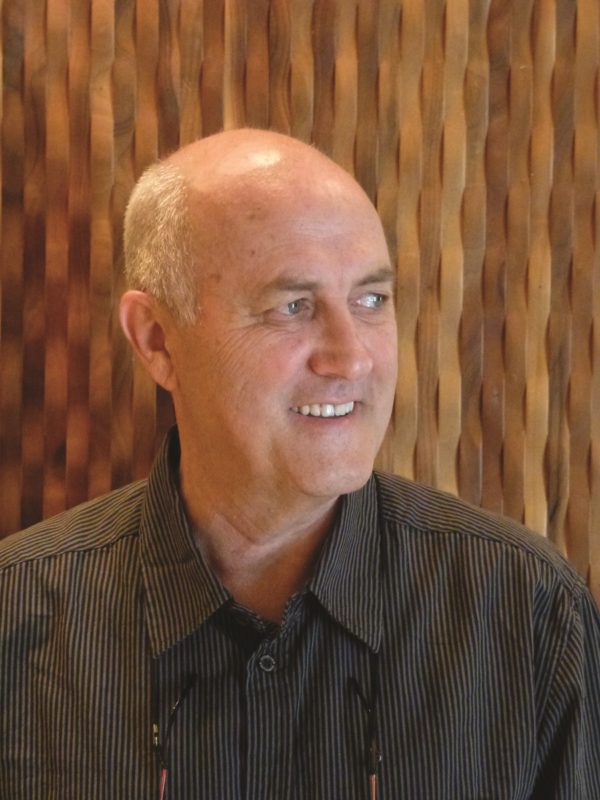
Javier Busto was born in Hondarribia (Gipuzkoa) on 13 November 1949. A choral singer since childhood, in his youth he was part of various rock and folk music groups. He was awarded a degree in medicine by the University of Valladolid. Selected through national entrance exams for the role of family doctor with the Servicio Vasco de Salud–Osakidetza, he currently practices his profession in Lezo (Gipuzkoa). As a musician he is self taught. He began to enter the world of choral music with the help of the maestro Erwin List. While at the University of Valladolid he became conductor of the Ederki Basque choir (1971-6), a position in which he won Third Prize at a competition in Tolouse in 1975. It was during this time that he began to write his first choral works. Founder and conductor of the Eskifaia Choir of Hondarribia (1978-1994), he won First Prize at Ejea de los Caballeros, Tolosa, Avilés, Tours (France), Gorizia (Italy), Spittal an der Dräu (Austria) and Mainhausen, Marktoberdorf (Germany). He also founded and conducted Kanta Cantemus Korua (1995-2007), in Gipuzkoa, a female choir with which he won first prize at Tours (France) (1997-2007) and in Tolouse (1999). He won prizes for composing at Bilbao, Tolosa, Igualada and Madrid. His works have been published in Germany (Carus Verlag and Ferrimontana); France (Editions à Coeur Joie); the Basque Country (Bustovega and CM Ediciones Musicales); the UK (Oxford University Press); Sweden (Gehrmans Musikförlag) and the USA (Walton, Alliance Music Publishers and Santa Bárbara). He teaches courses and workshops on choral conducting and sits on the jury at choral composition and performance competitions in Germany, Argentina, Australia, Belgium, Canada, Croatia, Spain, the USA, France, the Netherlands, Hungary, Italy, Japan, Sweden, Taiwan and Venezuela. He is a member of the technical committee of the Certamen de Masas Corales in Tolouse. Email: bv@bustovega.com
Translated from the Spanish by Ross Nelhams, UK/Italy
Click on the image to download the full score
© Javier Busto – 2010


